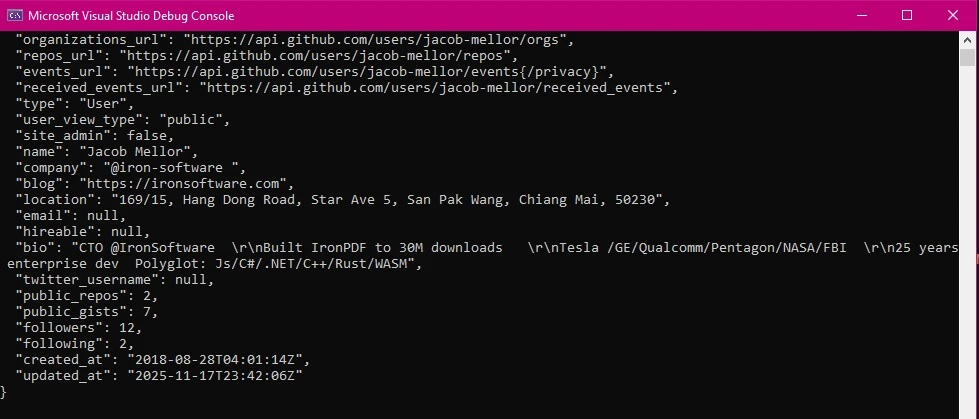Prism Logging (How It Works For Developers)
Console applications, despite their lack of a graphical user interface, often require robust logging mechanisms to track errors, monitor application performance, and debug issues efficiently. Prism.Plugin.Logging, an extension of the Prism Logging framework, offers a comprehensive logging solution for .NET applications, including support for various logging providers.
In this article, we explore how to integrate Prism Logging into console applications using IronPDF, a powerful .NET library for working with PDF documents. By combining these tools, developers can implement advanced logging functionality in their console applications, enhancing maintenance and troubleshooting capabilities.
Introduction to Prism Logging
Prism.Plugin.Logging extends Prism, a popular framework for building XAML applications, by providing comprehensive logging capabilities. With support for multiple logging providers such as NLog, Serilog, and Microsoft.Extensions.Logging, Prism.Plugin.Logging offers flexibility and customization options to suit various application requirements.
Advantages of using Prism logging
Flexible Logging Configuration: Prism.Plugin.Logging allows developers to configure various logging providers seamlessly, including popular options like NLog, Serilog, and Microsoft.Extensions.Logging.
Structured Logging Support: Developers can log-structured data with their messages using Prism.Plugin.Logging. This function is especially helpful in scenarios involving console applications where comprehensive context data, including timestamps, error codes, or user activities, must be recorded and added to log reports produced by IronPDF.
How to use Prism logging
- Create a new C# project
- Install the Prism logging package.
- Create an object for the SyslogLogger and pass the configuration as the parameter.
- Call the log method whenever required and pass the log message and logging level.
- Dispose of the log object at the end.
Getting Started With Prism Logs
Setting up Prism in C# Projects
Integrating Prism into a C# project is easy. Utilizing NuGet, Microsoft's .NET package manager is necessary in order to add Prism. The tools and libraries needed to incorporate Prism Logs into your projects are provided by this library.
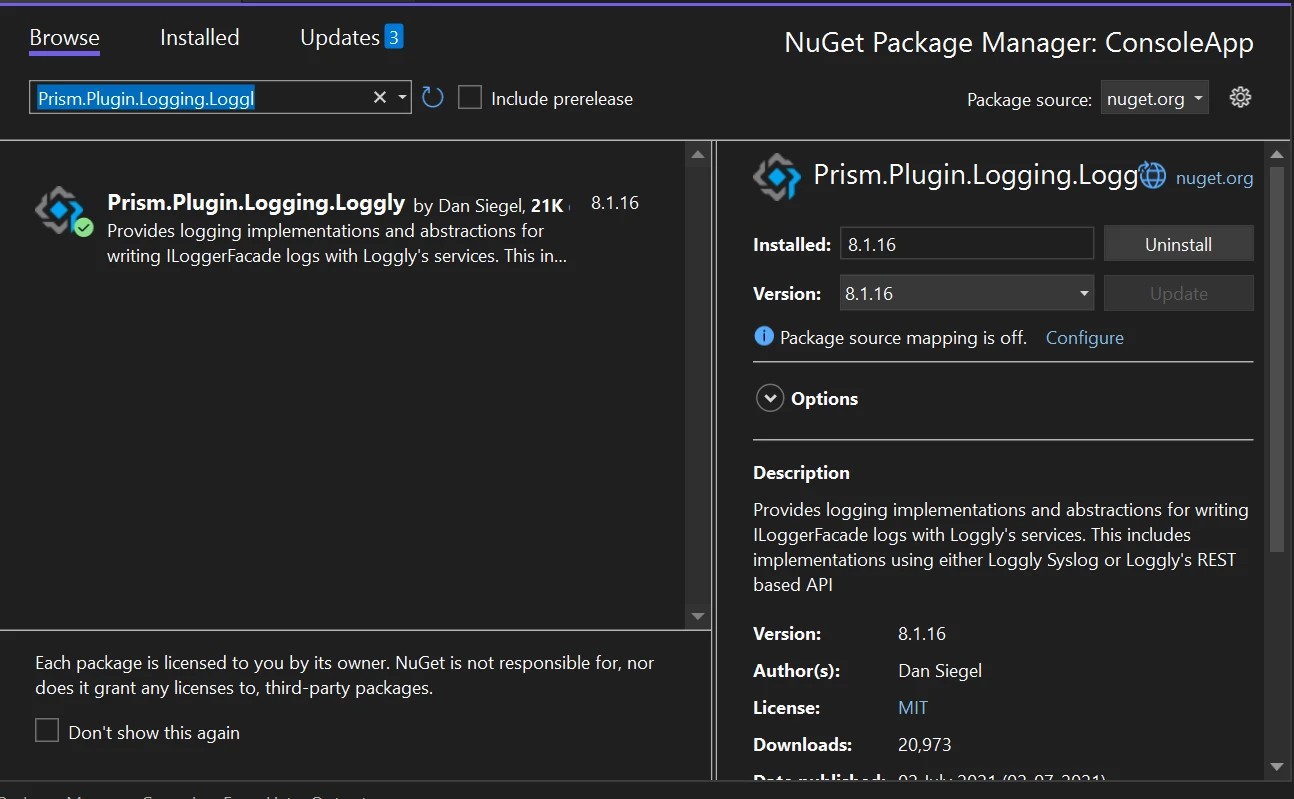
Implementing Prism in Dot .NET Applications
Prism is compatible with a number of Dot .NET application types, including Windows Forms (WinForms) and Windows Console. Although each framework is implemented differently, the basic concept is always the same, assisting us in logging the data related to your application.
Creating a New Project in Visual Studio
Choose the File menu in the Visual Studio application. Click "New Project," then choose "Console application."
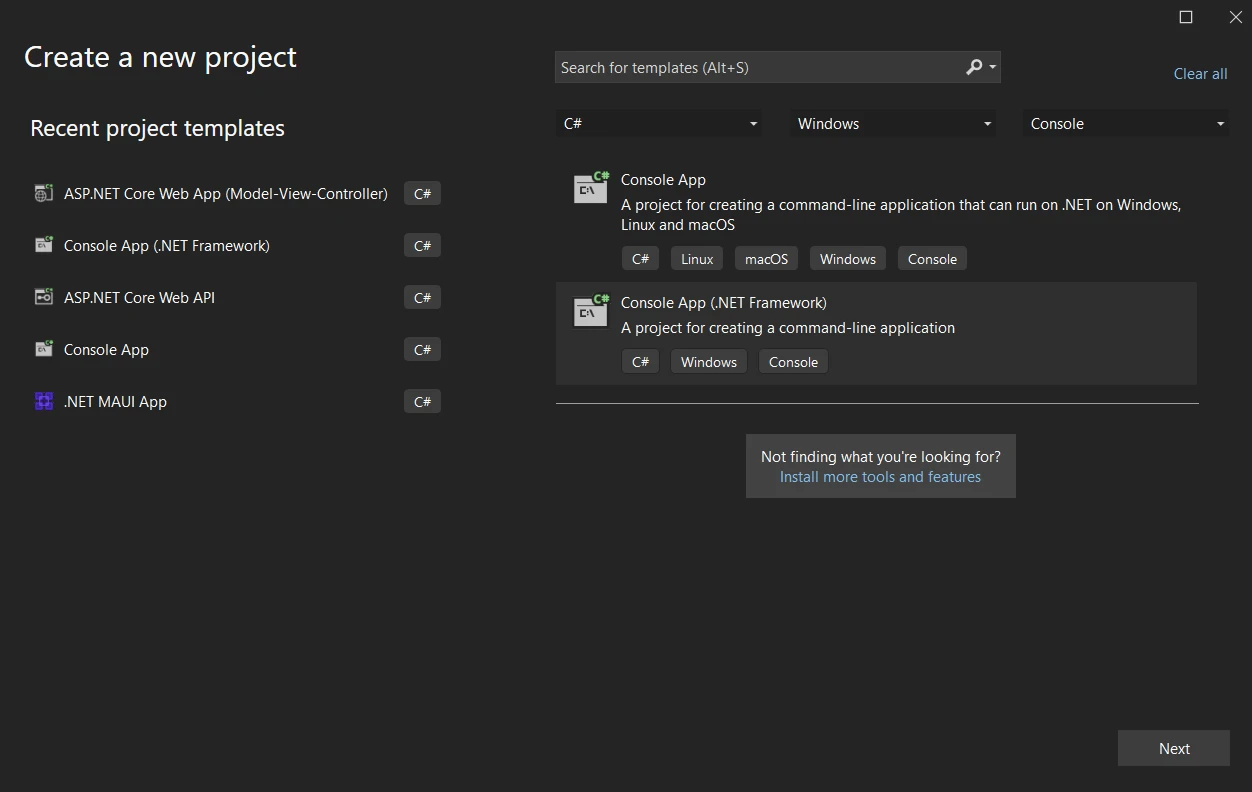
Enter the project name in the designated text area after selecting the file location. Then, as shown in the sample below, select the necessary .NET Framework by clicking the Create button.
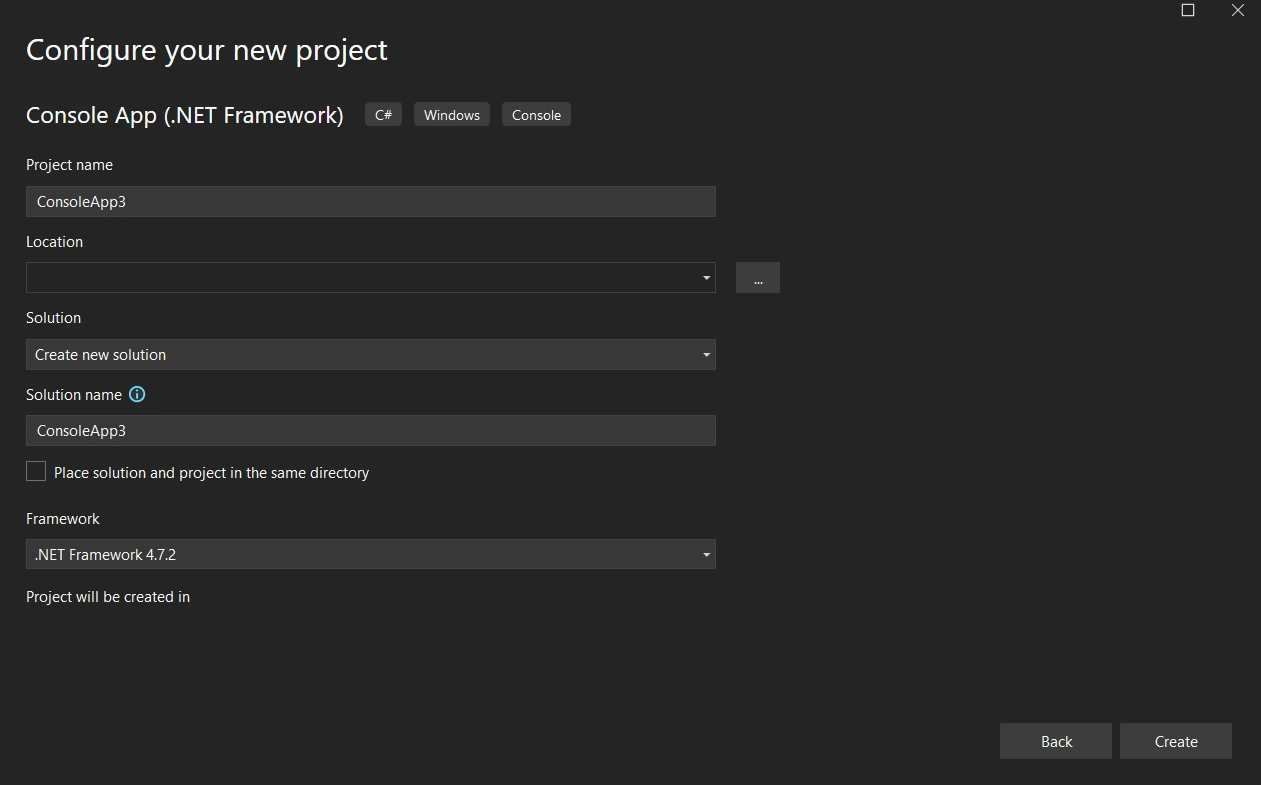
The chosen application will then determine how the Visual Studio project is organized. Simply open the program.cs file to begin adding code to the application and building it. You can use Windows, the console, or the web application.
After this, the library may be added and the code tested.
A Basic Example of Using Prism Logs
In the code example below, we initialize the Prism log object and then add different logging levels one by one into the Prism logs, saving all the logs and their criticality into a list.
using Prism.Logging.Syslog;
using System;
using System.Collections.Generic;
using System.Threading.Tasks;
class Program
{
public class Demo
{
public string Name { get; set; }
public int Age { get; set; }
// Configure the logger options
static Options genOptions = new Options
{
HostNameOrIp = "127.0.0.1",
Port = 514,
AppNameOrTag = "LoggingDemo"
};
static SyslogLogger logger = new SyslogLogger(genOptions);
static IList<LogData> Loglst = new List<LogData>();
static async Task Main(string[] args)
{
MessageLog("Application started.", Prism.Logging.Syslog.Level.Information);
PerformApplicationLogic();
MessageLog("Application stopped.", Prism.Logging.Syslog.Level.Information);
}
static void PerformApplicationLogic()
{
// Example application logic
Console.WriteLine("Performing application logic...");
// Simulate error
try
{
throw new Exception("Simulated Exception");
}
catch (Exception ex)
{
MessageLog($"Error occurred: {ex.Message}", Prism.Logging.Syslog.Level.Error);
}
}
// Logs messages and their levels
static void MessageLog(string message, Prism.Logging.Syslog.Level level)
{
Loglst.Add(new LogData { Message = message, Level = level.ToString() });
logger.Log(message, level);
}
public class LogData
{
public string Message { get; set; }
public string Level { get; set; }
}
public class Options : ISyslogOptions
{
public string HostNameOrIp { get; set; }
public int? Port { get; set; }
public string AppNameOrTag { get; set; }
}
}
}using Prism.Logging.Syslog;
using System;
using System.Collections.Generic;
using System.Threading.Tasks;
class Program
{
public class Demo
{
public string Name { get; set; }
public int Age { get; set; }
// Configure the logger options
static Options genOptions = new Options
{
HostNameOrIp = "127.0.0.1",
Port = 514,
AppNameOrTag = "LoggingDemo"
};
static SyslogLogger logger = new SyslogLogger(genOptions);
static IList<LogData> Loglst = new List<LogData>();
static async Task Main(string[] args)
{
MessageLog("Application started.", Prism.Logging.Syslog.Level.Information);
PerformApplicationLogic();
MessageLog("Application stopped.", Prism.Logging.Syslog.Level.Information);
}
static void PerformApplicationLogic()
{
// Example application logic
Console.WriteLine("Performing application logic...");
// Simulate error
try
{
throw new Exception("Simulated Exception");
}
catch (Exception ex)
{
MessageLog($"Error occurred: {ex.Message}", Prism.Logging.Syslog.Level.Error);
}
}
// Logs messages and their levels
static void MessageLog(string message, Prism.Logging.Syslog.Level level)
{
Loglst.Add(new LogData { Message = message, Level = level.ToString() });
logger.Log(message, level);
}
public class LogData
{
public string Message { get; set; }
public string Level { get; set; }
}
public class Options : ISyslogOptions
{
public string HostNameOrIp { get; set; }
public int? Port { get; set; }
public string AppNameOrTag { get; set; }
}
}
}Log reports are generated from Prism Logging. We are using a tool called Kiwi Syslog Service Manager to monitor the Prism logs.
Output Prism Log file

Prism Logs Operations
Extensible Logging
Prism.Plugin.Logging's capabilities are expanded via logging, which provides more functionality and flexibility. It offers a range of configuration options to adjust log levels, log targets, and other variables to meet the logging needs of your application.
Multiple Log Targets
You may route log messages to a variety of locations, including the console, files, databases, and other logging services, with Prism.Plugin.Logging. Because of this flexibility, you can select the best logging targets for the requirements and environment of your application.
Custom Loggers
With the plugin, you can implement Prism's ILoggerFacade interface to construct custom loggers. This lets you construct custom logging capabilities based on the needs of your application or interface with third-party logging frameworks.
Create Log with Prism Logs
Prism logs can be easily created with a few lines of code. Below is the sample to create a log.
static Options genOptions = new Options
{
HostNameOrIp = "127.0.0.1",
Port = 514,
AppNameOrTag = "LoggingDemo"
};
static SyslogLogger logger = new SyslogLogger(genOptions);
logger.Log("Sample message", Prism.Logging.Syslog.Level.Information);static Options genOptions = new Options
{
HostNameOrIp = "127.0.0.1",
Port = 514,
AppNameOrTag = "LoggingDemo"
};
static SyslogLogger logger = new SyslogLogger(genOptions);
logger.Log("Sample message", Prism.Logging.Syslog.Level.Information);Integrating Prism Logging and IronPDF
Using Prism and IronPDF Together
Combining Prism with IronPDF in a C# project opens some exciting possibilities. IronPDF is a fantastic tool for converting this content into PDFs, even though Prism is a great tool for working with logs. Programmers can create apps that log the item into a custom-designed PDF document because of this connectivity.
Prism Logging with IronPDF
By creating a Windows console application that utilizes Prism Logs, users can engage with the Logs inside your program. This control should fit on the console with plenty of room left over to make logs. Add server log operations and HTTP logs.
Install IronPDF
- Open the Visual Studio project.
Choose "Tools" > "NuGet Package Manager" > "Package Manager Console".
- In the Package Manager Console, type the following command and press Enter:
Install-Package IronPdf
- Another way to install IronPDF is using NuGet Package Manager for Solutions.
- Browse the IronPDF package in the search results, select it, then click on the "Install" button. Visual Studio will handle the download and installation automatically.
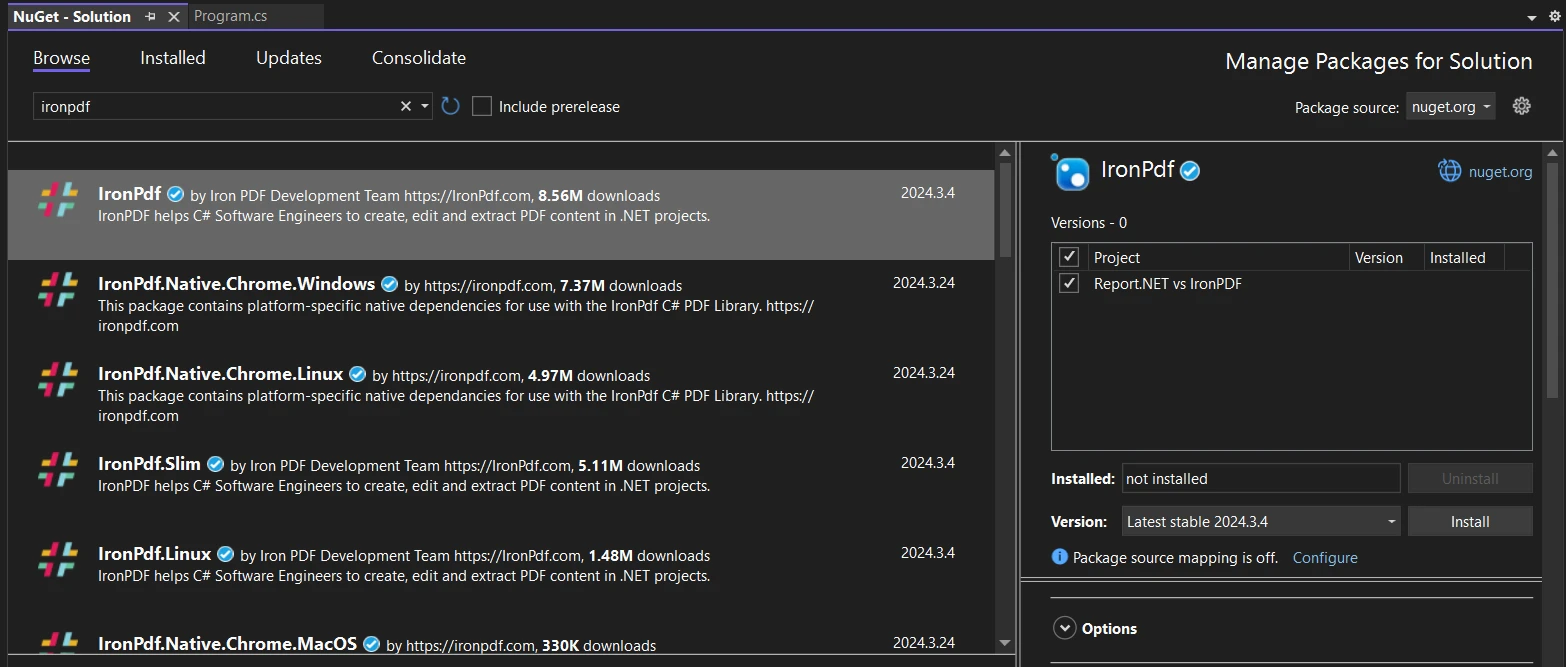
- NuGet will download and install the IronPDF package and any dependencies required for your project.
- Once IronPDF has been installed, you can use it for your project.
Install Through the NuGet Website
Visit the IronPDF page at https://www.nuget.org/packages/IronPdf on the NuGet website to learn more about IronPDF's features, compatibility, and other download options.
Utilize DLL to Install
Alternatively, you can incorporate IronPDF directly into your project by using its DLL file. To download the ZIP file containing the DLL, click this link. Once it has been unzipped, include the DLL in your project.
Implementing the Logic
- Setting Up the Renderer and Logger: The software sets up the IronPDF renderer and the Prism logger.
- Logging Messages: Messages with a designated category and priority can be logged using the MessageLog() method. In this example, we log the application's start and stop messages as well as any exceptions that arise while the application is executing.
- Applying Logic: A portion of application logic is simulated by the PerformApplicationLogic() method. To illustrate error logging, it merely produces a message and raises an exception in this case.
- Creating a PDF Log Report: Following the execution of the application logic, the software creates an HTML document based on the recorded messages. It then uses IronPDF's RenderHtmlAsPdf() feature to transform the HTML document into a log file as a PDF report. The PDF file is then saved to disk.
Extending the previously defined code to integrate IronPDF code:
using IronPdf;
static void GeneratePdfLogReport()
{
var renderer = new ChromePdfRenderer(); // Instantiates Chrome Renderer
// Generate HTML content for PDF report
string htmlContent = "<h1>Log Report</h1><ul>";
foreach (var log in Loglst)
{
htmlContent += $"<li><strong>Message: {log.Message}</strong> Level: {log.Level}</li>";
}
htmlContent += "</ul>";
// Generate PDF document
var pdfDocument = renderer.RenderHtmlAsPdf(htmlContent);
// Save PDF file
string filePath = "log_report.pdf";
pdfDocument.SaveAs(filePath);
Console.WriteLine($"PDF log report generated: {filePath}");
}using IronPdf;
static void GeneratePdfLogReport()
{
var renderer = new ChromePdfRenderer(); // Instantiates Chrome Renderer
// Generate HTML content for PDF report
string htmlContent = "<h1>Log Report</h1><ul>";
foreach (var log in Loglst)
{
htmlContent += $"<li><strong>Message: {log.Message}</strong> Level: {log.Level}</li>";
}
htmlContent += "</ul>";
// Generate PDF document
var pdfDocument = renderer.RenderHtmlAsPdf(htmlContent);
// Save PDF file
string filePath = "log_report.pdf";
pdfDocument.SaveAs(filePath);
Console.WriteLine($"PDF log report generated: {filePath}");
}Below is the image log report generated from IronPDF
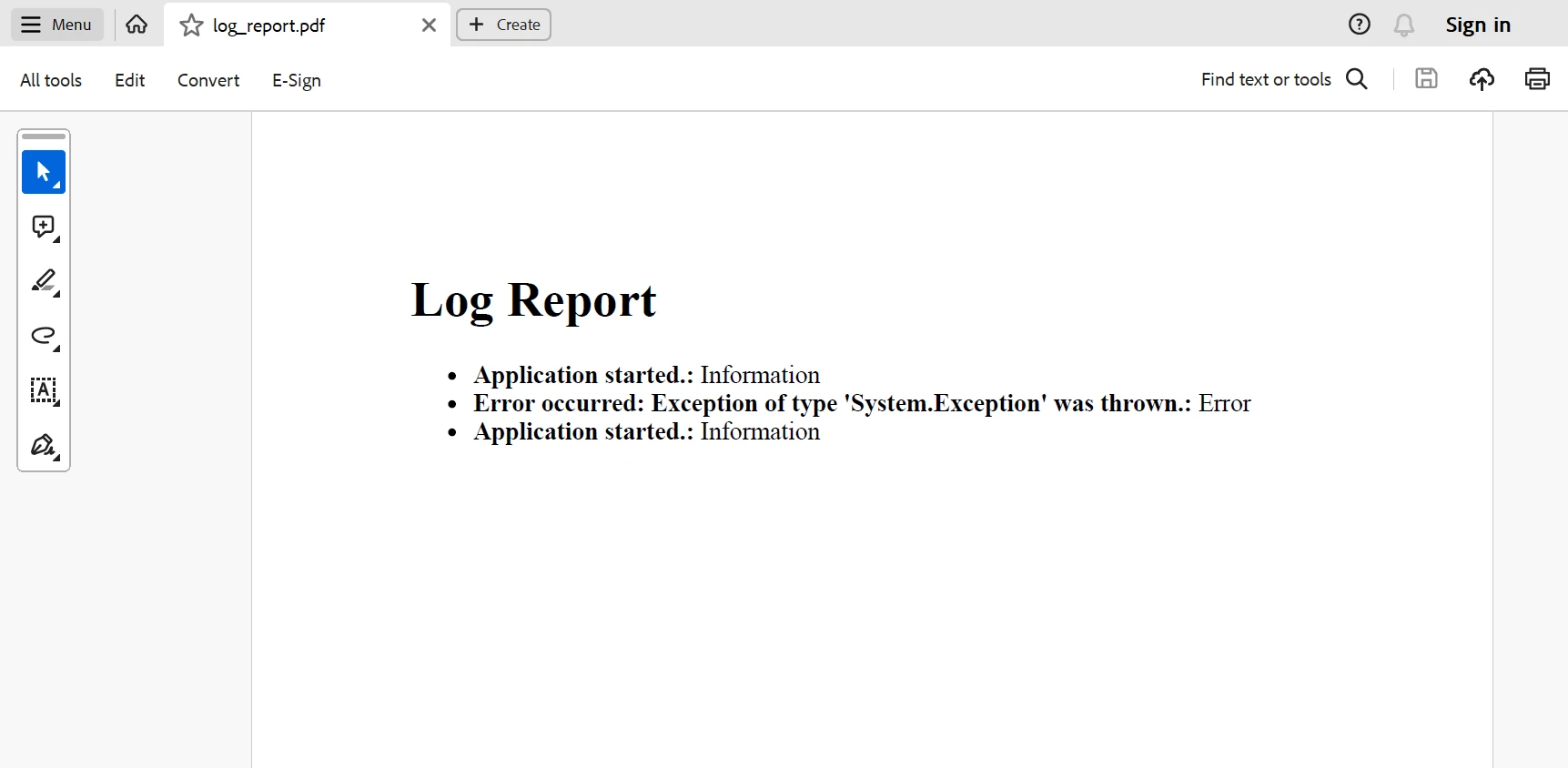
To know more about the IronPDF code references refer here.
Conclusion
Prism.Plugin.Logging integration with IronPDF allows developers to easily incorporate extensive logging capability into terminal apps. Developers can improve overall program maintenance, optimize debugging capabilities, and speed logging operations by utilizing the features of both tools. Prism.Plugin.Logging enables console applications to obtain complete logging coverage, guaranteeing strong monitoring and troubleshooting capabilities, with the right implementation and setup.
IronPDF offers a perpetual license of a Lite bundle that includes a permanent license, a year of software maintenance, and an upgrade of the library. IronPDF offers free licensing for development purposes, subject to restrictions on time and redistribution. To acquire the free trial. To find out more about the various Iron Software products, please visit their website link.
Frequently Asked Questions
How can I integrate logging into a .NET console application?
You can integrate logging into a .NET console application using Prism.Plugin.Logging, which supports various logging providers and offers a structured logging framework. To set it up, install the Prism logging package, create the necessary logging objects, and configure your logging targets and levels.
What are the benefits of combining Prism Logging with IronPDF?
Combining Prism Logging with IronPDF allows you to generate PDF log reports, enhancing application maintenance and troubleshooting. IronPDF can convert HTML log content into PDF documents, providing a portable format for reviewing and sharing logs.
How can I convert log data into a PDF document in .NET?
To convert log data into a PDF document in .NET, use IronPDF to render your log data as HTML and then convert it to a PDF using methods like RenderHtmlAsPdf. This allows you to create detailed and portable log reports.
What logging providers are compatible with Prism.Plugin.Logging?
Prism.Plugin.Logging is compatible with multiple logging providers, including NLog, Serilog, and Microsoft.Extensions.Logging. This flexibility allows developers to choose the logging provider that best fits their project's needs.
How do I set up a Prism logging project in Visual Studio?
To set up a Prism logging project in Visual Studio, create a new C# project, install the Prism logging package using the NuGet Package Manager, and initialize the logging framework by creating a SyslogLogger object and configuring log levels and targets.
Can Prism.Plugin.Logging be used for custom logging configurations?
Yes, Prism.Plugin.Logging supports custom logging configurations. You can adjust log levels, define custom loggers, and route log messages to various destinations, allowing for a tailored logging setup that meets specific application requirements.


